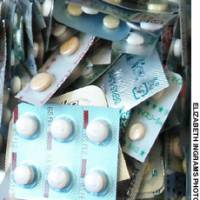For depression sufferers, medicines to relieve their misery are nothing less than godsends. So they are, too, for those firms pumping ever-more antidepressants into the drug-friendly Japanese market.
But it wasn't always that way. Although Japan is the world's second-largest pharmaceuticals market behind the United States, medical treatment for psychological problems long had a social stigma attached -- a stigma that until recently all but quashed both development and sales.
"New antidepressants just didn't come out," said Yuko Iwamoto, a pharmaceuticals analyst at Yano Research Institute in Tokyo.
That being so, total annual sales in Japan hovered around a paltry 17 billion yen until as recently as the mid-1990s. Those sales, a mere $180.9 million when converted into 1995 dollars, were certainly unimpressive when compared to reported U.S. revenues of more than $2 billion that year for U.S. pharmaceutical giant Eli Lilly's blockbuster antidepressant Prozac alone.
But then, sensing that huge numbers of Japanese were suffering depression in silence -- with estimates varying between 3 and almost 15 percent of the population -- major drug companies launched aggressive marketing campaigns to lift the lid of secrecy and shame shrouding sufferers and their families in Japan.
Among their strategies were television commercials assuring viewers that being depressed was no more shameful than catching a common cold. Meanwhile, pharmaceutical companies dispatched small armies of agents to persuade doctors -- not only psychiatrists but other practitioners treating physical conditions that cause depression -- to prescribe, prescribe, prescribe.
As a result, by 1999, when a whole swath of sophisticated new antidepressants did hit the Japanese market, the country was well primed to consume.
New national mood
One of the new drugs was British pharmaceutical giant GlaxoSmithKline's medicine Paxil -- a so-called "selective serotonin re-uptake inhibitor" that boosts the presence in the brain of serotonin, a chemical believed to help regulate mood. Sales of Paxil took off, as did those for another SSRI that debuted in 1999 under the names Luvox and Depromel.
Amid this new national mood created by multinationals' marketing departments, sales of antidepressants have quite simply skyrocketed. From those annual sales of around 17 billion yen less than a decade ago, analysts are now estimating that the market exceeded 65 billion yen last year.
With its reputation for causing fewer side effects than older antidepressants, Paxil was able to claim around half of this bonanza, while Luvox and Depromel together accounted for about a fifth of market share.
And there is no slowdown in sight as market conditions warm ever more to the pill-popping way of dealing with depression. In particular, visiting a psychiatrist isn't the gloomy, guilt-ridden experience it used to be in Japan, with mental-health clinics now gaining far wider public acceptance, said analyst Iwamoto.
"Nowadays, it's easier to go," she said. Meanwhile, she added, the drug companies are aiming to broaden the market for antidepressants to include, for example, sufferers from post-traumatic stress disorder, social-adjustment disorder and general-anxiety disorder.
To be sure, analysts are waiting to see what happens if and when big rival antidepressants from overseas -- chief among them Prozac and drugmaker Pfizer's Zoloft -- ever debut in Japan. Few are in any doubt that the sales outlook is rosy -- the only real question is how rosy?
Sad to say, Iwamoto believes that only about a fifth of depressed Japanese have so far sought professional attention -- meaning a giant reservoir of potential sales remains untapped. "There is," she said, "still plenty of demand."



















With your current subscription plan you can comment on stories. However, before writing your first comment, please create a display name in the Profile section of your subscriber account page.